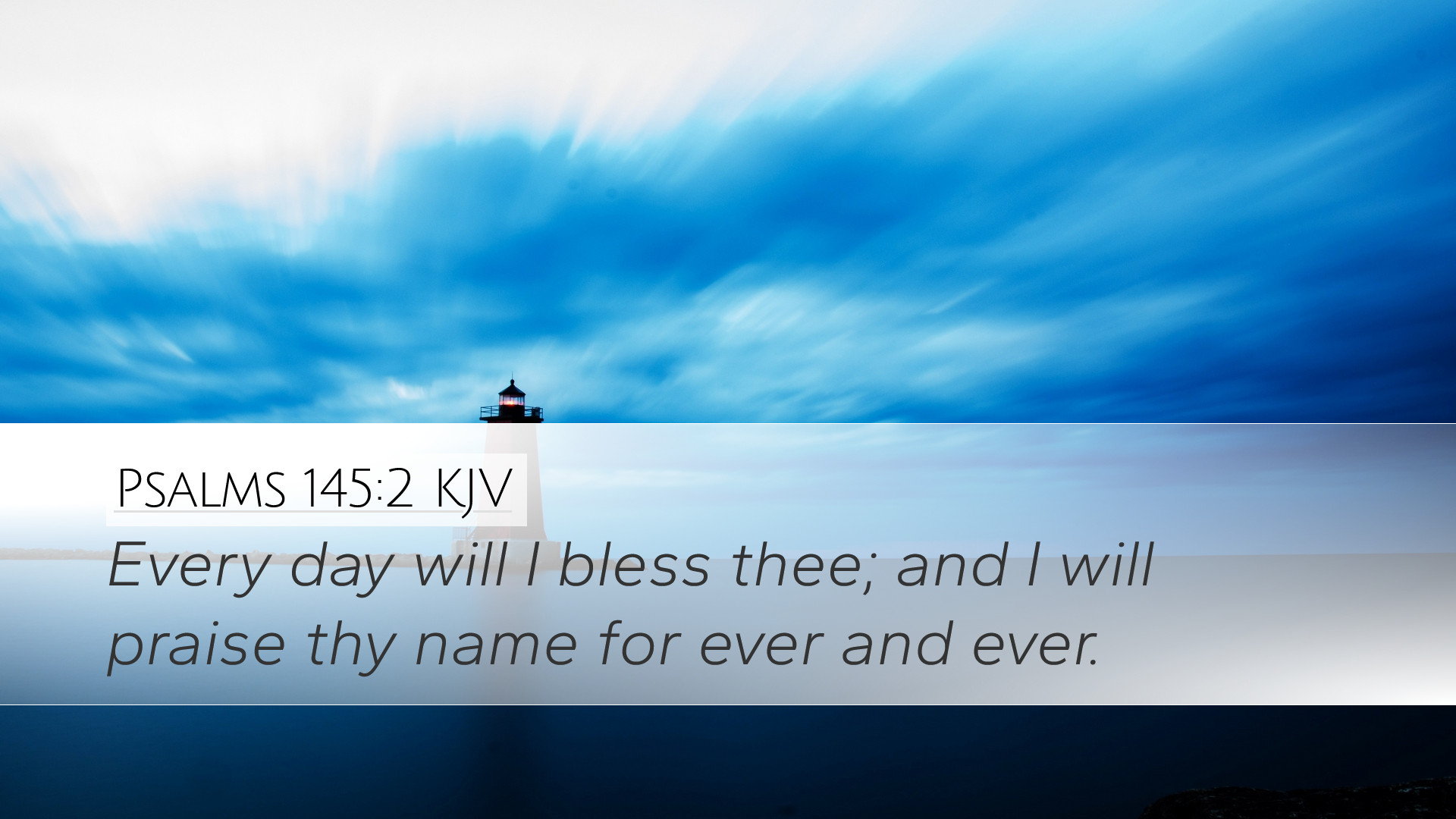Psalms 145:2 Commentary
Bible Verse: Psalms 145:2 - "Every day will I bless thee; and I will praise thy name for ever and ever."
This verse encapsulates the dual themes of daily devotion and eternal praise, highlighting the nature of worship as a continuous experience rather than a mere ritual. In the exploration of this passage, we draw upon the insights of notable public domain commentators to deepen our understanding.
1. Daily Blessing
Matthew Henry emphasizes the importance of daily blessings, noting that this practice signifies a believer's acknowledgment of God's continual goodness. He remarks that our daily lives should be infused with gratitude, reminding believers to cultivate a habit of recognizing God's mercies each day.
Albert Barnes expands on this thought, suggesting that blessing God daily involves an active engagement in worship. He interprets "bless" not merely in a verbal sense but as an action representing a lifestyle of praise that permeates all aspects of life. In this context, the act of blessing serves as both an expression of thanks and a commitment to uphold God's glory in our daily interactions.
2. The Nature of Praise
Adam Clarke brings forward the concept of praising God's name, noting that "name" in Biblical terms often signifies a person’s character and attributes. Clarke insists that when we praise God’s name, we are extolling His virtues such as His holiness, love, and sovereignty. Understanding God's nature provides deeper dimensions to our praise.
Matthew Henry continues this theme by discussing the appropriateness of praising God's name throughout all seasons of life. He relates that irrespective of one’s circumstances, the faithful should find reasons for joy and gratitude, as God’s character remains unchanged. Thus, the call to praise becomes not only an obligation but a privilege.
3. Forever and Ever
The phrase "for ever and ever" suggests an ongoing and eternal relationship with God. Albert Barnes notes the confidence that arises from knowing that praise is not limited to temporal experiences but extends into eternity. This implies a continuity in worship that transcends earthly existence, echoing the sentiments found throughout Scripture regarding everlasting life and fellowship with God.
Adam Clarke remarks that such eternal praise signifies the ultimate fulfillment of human purpose. Clarke argues that our existence is inherently tied to the act of glorifying God forever, and this verse serves as a reminder of our ultimate destination and calling as believers.
Theological Implications
In the context of theology, Psalms 145:2 calls practitioners to reflect deeply on the nature of worship. Matthew Henry posits that this verse signifies the relationship between God and the believer, which is characterized by mutuality—God’s grace prompts the believer’s response of praise.
Furthermore, Albert Barnes suggests that the verse serves as an encouragement for believers to persist in worship despite life’s challenges. Emphasizing God's eternal nature, it reassures us that our commitment to praise aligns with God’s unchanging promises and character.
Practical Application
To deeply integrate the insights from Psalms 145:2 into practical life, pastors and theologians are encouraged to foster a culture of daily worship within their congregations. Matthew Henry suggests incorporating daily practices of gratitude, such as prayers of blessing or testimonies, to cultivate an environment that honors God continually.
Additionally, Adam Clarke notes that understanding the attributes of God enriches our worship experience. Leaders in ministry can encourage congregations to engage in theological study as a means to deepen their understanding of God’s character and, subsequently, inspire deeper worship.
Concluding Remarks
Psalms 145:2 succinctly captures the essence of our relationship with God—characterized by gratitude, praise, and an eternal perspective. By committing to bless God daily and to elevate His name perpetually, believers engage fully in the divine life He offers. The combined wisdom of Matthew Henry, Albert Barnes, and Adam Clarke provides a comprehensive understanding of this verse, urging all to embrace a lifestyle rooted in heartfelt worship and unwavering praise.


